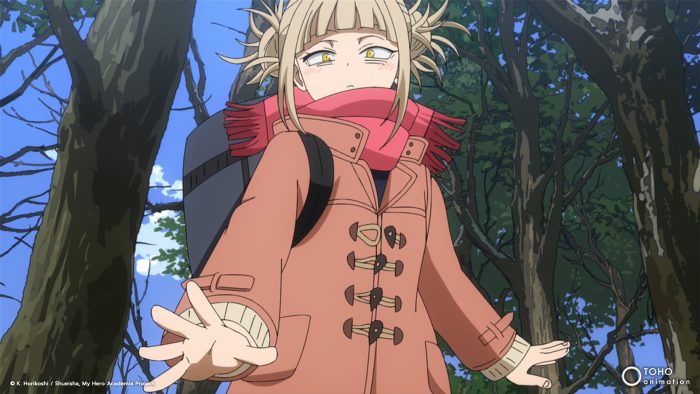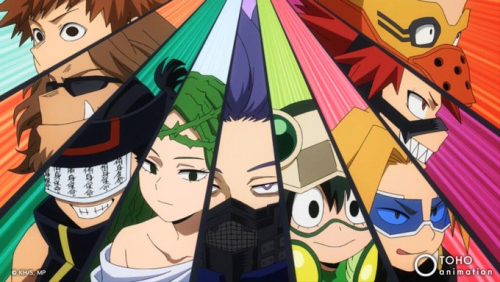
[ad_1]

[ad_top1 class=”mb40″]

[sourceLink asin=”” asin_jp=”” cdj_product_id=”” text=”twitter” url=”https://twitter.com/MHAOfficial/status/1433550332068614157?s=20″ ]
Boku no Hero Academia (My Hero Academia) Season 5 was highly anticipated after the intensity of the fourth season and it served as a 24-episode set-up of the coming season, which will feature the pivotal battle against what was the Meta Liberation Army. A lot of important things happened in this season, particularly the ominous rumours of an impending war and a threat unlike anyone has ever imagined. Despite all the important events of this one, this season still paled in comparison to previous ones! Find out why as we discuss what made My Hero Academia Season 5 good and interesting, and what made it not very Plus Ultra! Be warned; however, this article comes with a heap of spoilers!
– Spoilers Ahead –
Subpar Pacing
If we talk about how a story journeys from its beginning to its end and how long it takes to do that, we’ve begun a conversation about pacing. With this season of My Hero Academia, the quality of the pacing has fallen significantly, with the brunt of the season being made up of not one, but two training arcs! The first is an interesting set of group battles between class 1-A and 1-B, followed by a work-study arc that also doubled as an Endeavor character development arc as it followed him and the Todoroki family a lot more closely.
The problem is that the majority of this season was made up of training arcs and when all was said and done, many of the pivotal moments in terms of plot progression were dulled by the overall slowness of the story at that point. One of the most lacklustre but important moments was Endeavor’s discovery of Hawks’ important message inside the book titled “The Meta Liberation War”, a manifesto written by the original Destro during his incarceration. Following Endeavor’s eyes as he pieced together the highlighted words and phrases in order seemed to be setting us up for a hefty climax; however, it seemed to fall flat even though Endeavor was reading about an army large enough to take down Japan!
The story lacked a lot of its edge as the low-stakes training arcs were piled on top of each other, and the focus was mainly on the development of the young heroes, particularly Deku, whose major character arc this season came at the very beginning, upon his manifestation of a second Quirk after having witnessed visions of the previous wielders of One For All. It only really begins to pick up again when the events at Deika City are alluded to rather ominously prior to the work-study part of the season. However, we only get to what actually happens at Deika City in the “My Villain Academia” arc (also known as the Meta Liberation Army arc) of the series, which only got five measly episodes but added major developments for the characters of Twice (Quirk: Double), Toga Himiko (Quirk: Transform) and Shigaraki Tomura (Quirk: Decay). It feels like the “My Villain Academia” arc gave us more bang for our buck than the other episodes did. In fact, that arc was so far ahead of the others in terms of overall relevance to the plot, characters, stakes, character development, soundtrack, fights and the use of subtext in the writing was particularly strong here. These episodes, particularly 108 to 113, are some of the best episodes in the overall story of My Hero Academia so far.

[sourceLink asin=”” asin_jp=”” cdj_product_id=”” text=”twitter” url=”https://twitter.com/MHAOfficial/status/1392842128015994887/photo/1 ” ]
Top-Tier Plot and Character Development
The thing we can praise this season of My Hero Academia for is how well it presented the villains and their origin stories, more specifically those of Shigaraki Tomura (Quirk: Decay), Toga Himiko (Quirk: Transform) and Bubaigawara Jin (Villain Name: Twice; Quirk: Double). The way it juxtaposed the Meta Liberation Army and its goals with the ambitions of Shigaraki’s League of Villains; especially considering Shigaraki’s arc concerning his succession of All For One, is some of the best writing we’ve seen in this show so far, and it made the Villains arc the best part of this season by an incredible margin.
Part of the reason why it was so significant that the villains’ origins were shown to us is the fact that they’d been popular yet very mysterious characters that have been with us from the first season. One of the major plot breakthroughs was the discovery that League of Villains member Kurogiri is actually a highly sophisticated Nomu made from the body of a high school friend of Eraser Head and Present Mic. The way certain parts of this season added interesting elements to the lore was quite excellent, but not in the way that the origin story of Shigaraki did.
[sourceLink asin=”” asin_jp=”” cdj_product_id=”” text=”twitter” url=”https://twitter.com/MHAOfficial/status/1434048608240816134/photo/1″ ]
We have Shigaraki Tomura placed in the seat of the former leader of the villains in this show; a successor of evil identified by the primary antagonist himself. In this way, Shigaraki has been positioned as this story’s true villain in the way that Deku has been established as the protagonist and true hero. The subtext with this juxtaposition is the fact that, through Shigaraki’s several flashbacks, we come to realise that he is the grandson of Shimura Nana, who we know was the mentor of All Might and his predecessor in the nurturing of One For All! Shigaraki’s own childhood is littered with memories of his sister and himself aspiring to become professional heroes like their grandmother was; however, Shimura Nana’s obligations took her away from her family, permanently fracturing her son’s perception of heroes. In turn, Nana’s son, Shigaraki’s father, passed on his trauma of abandonment and amplified it by instilling fear in his family members and adopting abusive punishments and tactics to mitigate his family seeing heroes in a remotely positive light. Shigaraki’s placement as the series antagonist is important, all the minor details of his character considered. What signifies Shigaraki’s ascent to this status is the return of his memories prior to being adopted by All For One. His resurfacing memories also bring the true extent of his abilities, an untamed, unfettered and completely unhinged expression of his Quirk, Decay. This enables Shigaraki to utterly dominate the ‘other’ villain boss who features this season, the Meta Liberation Army leader Re-Destro. Realising that Shigaraki embodies the kind of liberation of meta ability upon which the MLA hinges its entire ideology—Re-Destro finds a new leader in Shigaraki because of this, but Shigaraki’s ascension in this battle also render him the new leader in the eyes of Gigantomachia, who’d only take orders from All For One himself.
The 5th season starts on an exciting note when Deku sees visions of memories of previous wielders of One For All, including the progenitor of the Quirk, the brother of All For One. These vestiges of One For All begin to communicate with Deku and show him visions and memories as they have decided that it all ends with him, the ninth wielder of the Quirk. As a result of this particular development, Deku is now expected to learn and master the Quirks of his predecessors, two of whom didn’t have a visible Quirk to begin with. This leaves Deku with the task of not only mastering One For All, but also six other Quirks that have manifested as a result of the predecessors’ decision that he was the arbiter of the battle with All For One.
[sourceLink asin=”” asin_jp=”” cdj_product_id=”” text=”twitter” url=”https://twitter.com/MHAOfficial/status/1436064388260192263/photo/1″ ]
Overall
All in all, the fifth season of My Hero Academia seemed to be a setup for what’s to come in the sixth season, which is dropping next year. The war against Shigaraki’s Paranormal Liberation Front is where we expect the next season to start off, considering the last few scenes from this season showing the heroes of Class 1-A in gear and in formation in an area marked with cherry blossom trees, indicating it’s spring. While this season had a rather lukewarm beginning in general, it really shined in the villains arc, giving us some of the best plot developments and incredible nuance and compelling subtexts we’ve seen in My Hero Academia to date. It wasn’t as good as it should have been, but the villains arc was better than we could have hoped, and we’re hoping that the entirety of next season is just as good, if not better than the villains arc was.
[sourceLink asin=”” asin_jp=”” cdj_product_id=”” text=”twitter” url=”https://twitter.com/MHAOfficial/status/1436003990391623680/photo/1″ ]
Final Thoughts
My Hero Academia Season 5 had some truly significant and interesting moments, but some irregular pacing and low stakes for the most part made it feel like a bit of a placeholder at times. Other seasons of My Hero Academia have been a lot better overall for various reasons, but perhaps this season was a necessary sacrifice for the pivotal battle that’ll be happening in the sixth season. Only time will tell. What did you think about Boku no Hero Academia (My Hero Academia) Season 5? Drop a comment below and tell us your thoughts!
[author author_id=”055″ author=”” translator_id=””]
[ad_bottom class=”mt40″]
[recommendedPost post_id=’340038′ url=”” title=”” img=” class=”” widget_title=””]
[recommendedPost post_id=’339692′ url=”” title=”” img=” class=”” widget_title=””]
[recommendedPost post_id=’339474′ url=”” title=”” img=” class=”” widget_title=””]
[ad_2]




